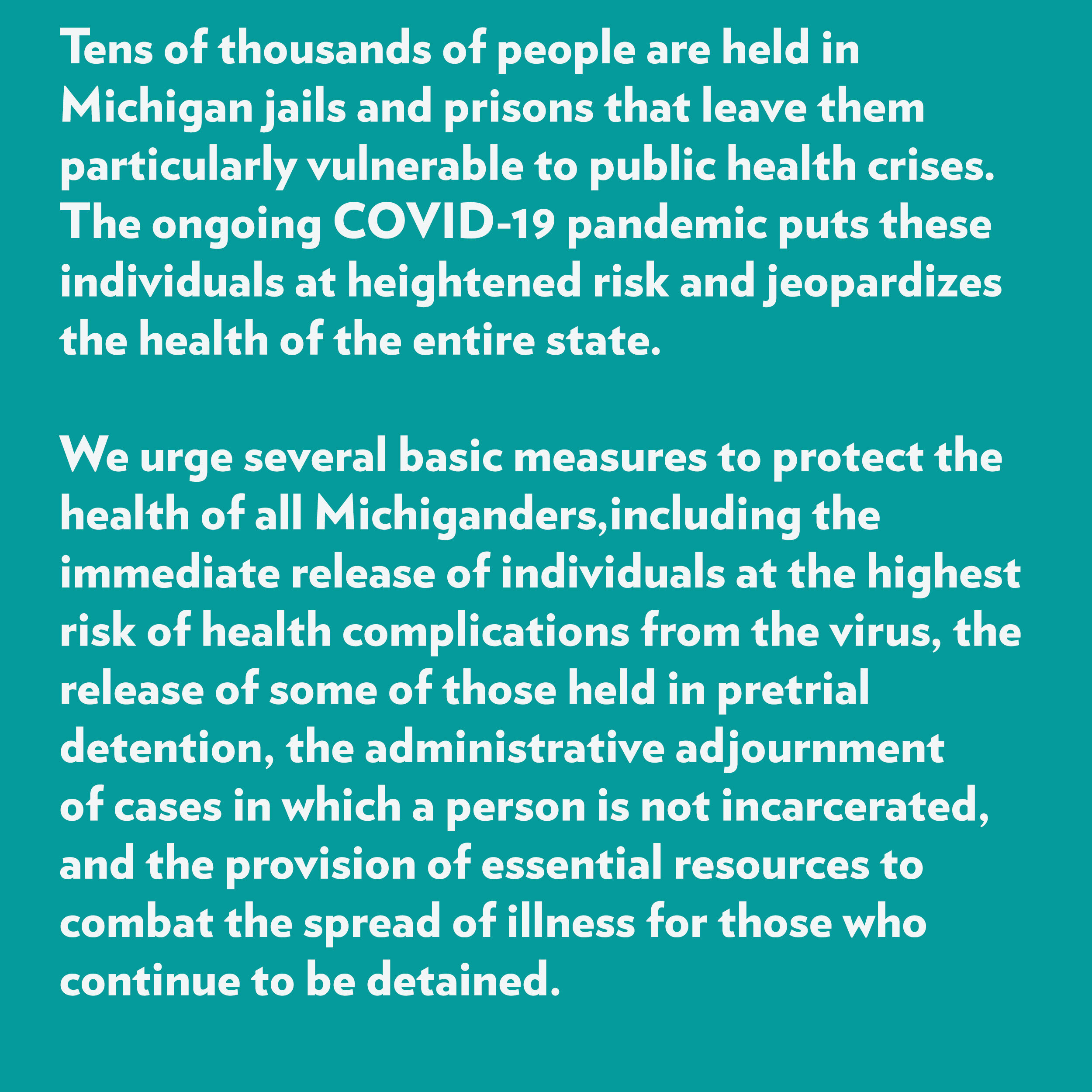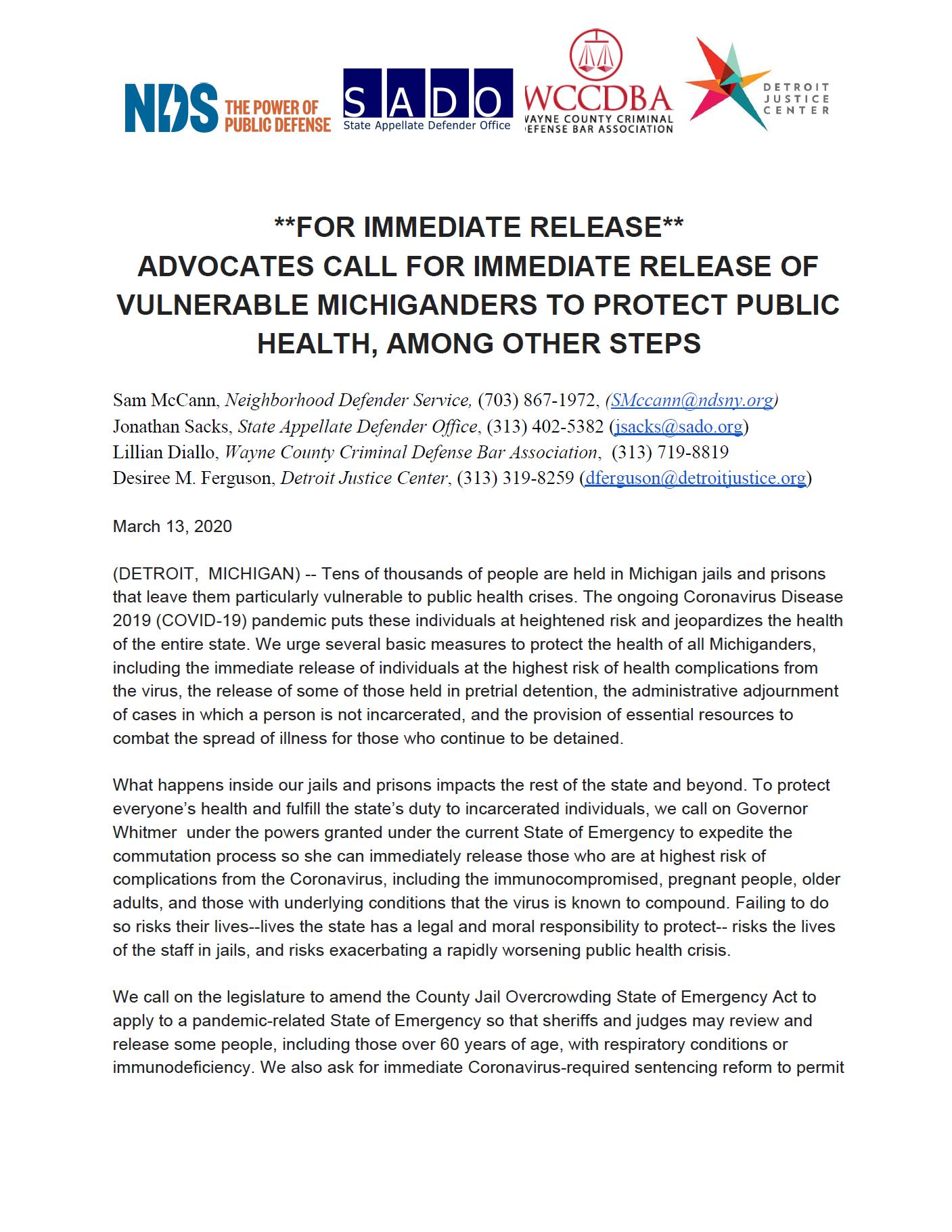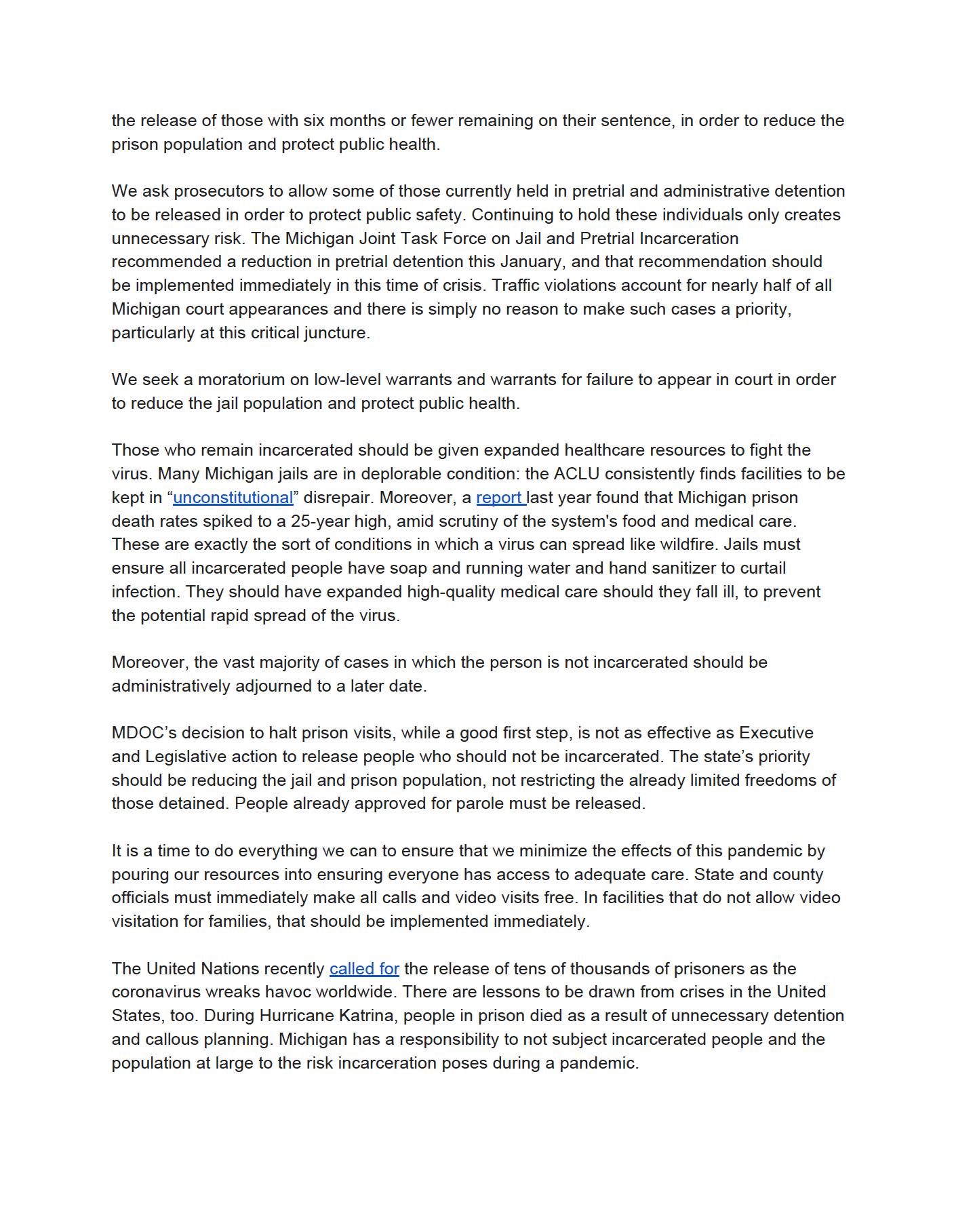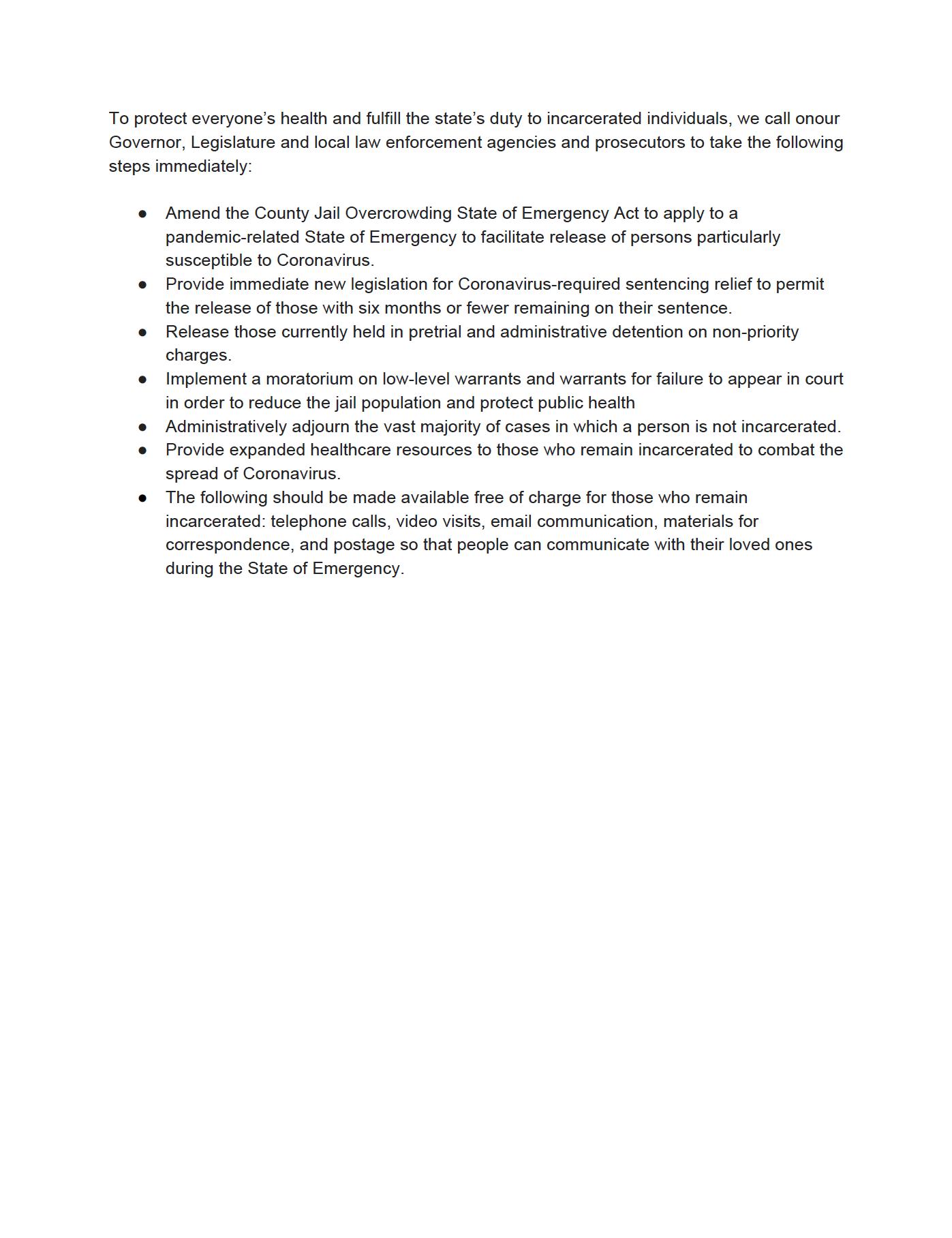[Transcription]
**FOR IMMEDIATE RELEASE**
ADVOCATES CALL FOR IMMEDIATE RELEASE OF
VULNERABLE MICHIGANDERS TO PROTECT PUBLIC
HEALTH, AMONG OTHER STEPS
Sam McCann, Neighborhood Defender Service, (703) 867-1972, ( SMccann@ndsny.org )
Jonathan Sacks, State Appellate Defender Office , (313) 402-5382 ( jsacks@sado.org )
Lillian Diallo, Wayne County Criminal Defense Bar Association , (313) 719-8819
Desiree M. Ferguson, Detroit Justice Center , (313) 319-8259 ( dferguson@detroitjustice.org )
March 13, 2020
(DETROIT, MICHIGAN) — Tens of thousands of people are held in Michigan jails and prisons
that leave them particularly vulnerable to public health crises. The ongoing Coronavirus Disease
2019 (COVID-19) pandemic puts these individuals at heightened risk and jeopardizes the health
of the entire state. We urge several basic measures to protect the health of all Michiganders,
including the immediate release of individuals at the highest risk of health complications from
the virus, the release of some of those held in pretrial detention, the administrative adjournment
of cases in which a person is not incarcerated, and the provision of essential resources to
combat the spread of illness for those who continue to be detained.
What happens inside our jails and prisons impacts the rest of the state and beyond. To protect
everyone’s health and fulfill the state’s duty to incarcerated individuals, we call on Governor
Whitmer under the powers granted under the current State of Emergency to expedite the
commutation process so she can immediately release those who are at highest risk of
complications from the Coronavirus, including the immunocompromised, pregnant people, older
adults, and those with underlying conditions that the virus is known to compound. Failing to do
so risks their lives–lives the state has a legal and moral responsibility to protect– risks the lives
of the staff in jails, and risks exacerbating a rapidly worsening public health crisis.
We call on the legislature to amend the County Jail Overcrowding State of Emergency Act to
apply to a pandemic-related State of Emergency so that sheriffs and judges may review and
release some people, including those over 60 years of age, with respiratory conditions or
immunodeficiency. We also ask for immediate Coronavirus-required sentencing reform to permit
the release of those with six months or fewer remaining on their sentence, in order to reduce the
prison population and protect public health.
We ask prosecutors to allow some of those currently held in pretrial and administrative detention
to be released in order to protect public safety. Continuing to hold these individuals only creates
unnecessary risk. The Michigan Joint Task Force on Jail and Pretrial Incarceration
recommended a reduction in pretrial detention this January, and that recommendation should
be implemented immediately in this time of crisis. Traffic violations account for nearly half of all
Michigan court appearances and there is simply no reason to make such cases a priority,
particularly at this critical juncture.
We seek a moratorium on low-level warrants and warrants for failure to appear in court in order
to reduce the jail population and protect public health.
Those who remain incarcerated should be given expanded healthcare resources to fight the
virus. Many Michigan jails are in deplorable condition: the ACLU consistently finds facilities to be
kept in “ unconstitutional ” disrepair. Moreover, a report last year found that Michigan prison
death rates spiked to a 25-year high, amid scrutiny of the system’s food and medical care.
These are exactly the sort of conditions in which a virus can spread like wildfire. Jails must
ensure all incarcerated people have soap and running water and hand sanitizer to curtail
infection. They should have expanded high-quality medical care should they fall ill, to prevent
the potential rapid spread of the virus.
Moreover, the vast majority of cases in which the person is not incarcerated should be
administratively adjourned to a later date.
MDOC’s decision to halt prison visits, while a good first step, is not as effective as Executive
and Legislative action to release people who should not be incarcerated. The state’s priority
should be reducing the jail and prison population, not restricting the already limited freedoms of
those detained. People already approved for parole must be released.
It is a time to do everything we can to ensure that we minimize the effects of this pandemic by
pouring our resources into ensuring everyone has access to adequate care. State and county
officials must immediately make all calls and video visits free. In facilities that do not allow video
visitation for families, that should be implemented immediately.
The United Nations recently called for the release of tens of thousands of prisoners as the
coronavirus wreaks havoc worldwide. There are lessons to be drawn from crises in the United
States, too. During Hurricane Katrina, people in prison died as a result of unnecessary detention
and callous planning. Michigan has a responsibility to not subject incarcerated people and the
population at large to the risk incarceration poses during a pandemic.
To protect everyone’s health and fulfill the state’s duty to incarcerated individuals, we call onour
Governor, Legislature and local law enforcement agencies and prosecutors to take the following
steps immediately:
● Amend the County Jail Overcrowding State of Emergency Act to apply to a
pandemic-related State of Emergency to facilitate release of persons particularly
susceptible to Coronavirus.
● Provide immediate new legislation for Coronavirus-required sentencing relief to permit
the release of those with six months or fewer remaining on their sentence.
● Release those currently held in pretrial and administrative detention on non-priority
charges.
● Implement a moratorium on low-level warrants and warrants for failure to appear in court
in order to reduce the jail population and protect public health
● Administratively adjourn the vast majority of cases in which a person is not incarcerated.
● Provide expanded healthcare resources to those who remain incarcerated to combat the
spread of Coronavirus.
● The following should be made available free of charge for those who remain
incarcerated: telephone calls, video visits, email communication, materials for
correspondence, and postage so that people can communicate with their loved ones
during the State of Emergency.




